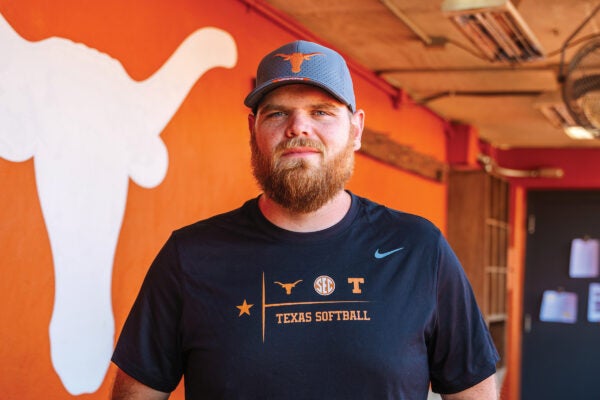What does it mean for someone to be a Longhorn? Can it be defined by the clothes they wear or how many football games they’ve been to? Are you a Longhorn the second you’ve been accepted to The University of Texas or the moment you walk the stage at graduation?
These are some of the questions students encounter on the first day of Acacia Chan’s course “Rhetoric of Fandom.” Throughout the class, Chan invites her students to explore fan culture through the lens of rhetoric, prompting investigations into a wide variety of fandoms, from Texas football to bird-watching to one of her own passions, Formula One racing.
“My goal was to draw as many fan communities together as possible and to allow for students to bring in as much of their fandom experience as possible,” she says. “I feel like I’ve been able to do that.”
Chan’s unconventional path to fandom studies informs her open-minded and ever-evolving approach to course design. With an undergraduate degree in biblical languages and two master’s degrees in religious studies under her belt, she decided to switch to comparative literature after her adviser retired.
Joining UT Austin’s Ph.D. program in 2018, Chan initially taught, and has continued to teach, the foundational undergraduate rhetoric class. Her engaging, discussion-based lecture style earned her the opportunity to develop a specialized course.
“The Department of Rhetoric and Writing is fantastic about nurturing our growth as teachers,” Chan says. “I have had a deep interest in fandom and fan studies for years, so my first instinct was to do just the fan fiction side of things, but I realized that rhetoric is about so much more than that. If I broaden my scope, I could reach more people.”

Long before she began her educational journey at UT, Chan found a communal love of literature through the fan community dedicated to picking apart the BBC adaptation of “Sherlock.” The experience of dissecting texts, debating interpretations and interacting with multigenerational fans helped Chan understand fan culture’s powerful ability to bring people together.
“For me, in my formative fandom years, seeing that these established, intelligent people who I considered to be mature were also really devoted to fandom impacted me. … I might not have the same understanding of what a fandom can be as I do now,” she says.
Chan’s early immersion into fan culture became the foundation for her pedagogy. She hopes to provide her students with the same opportunity to explore their passions through an academic lens.
From the beginning of the semester, students choose a fan community to study — whether it’s the NFL, anime or a niche subculture from the depths of Tumblr — while critically analyzing the rhetorical tools that shape them.
As the class progresses, students investigate controversies within their chosen communities, all while developing a proposal on how to address the problem they’ve identified.
The course culminates in a multimedia presentation to a panel of relevant community stakeholders, ranging from TV executives to education boards. Chan notes that students have consistently found ways to surprise her with their proposal designs — 3D-printed “Star Wars” prototypes, hand-drawn comics and self-written fan fiction are only the tip of the iceberg.
Chan encourages her students to critically engage with their fandoms and find ways to bring their theoretical ideas to life. “It doesn’t have to be the answer. It doesn’t have to be the solution, but it has to be a step in the right direction, and it has to be something actionable,” she says.

Fandom studies is a relatively new academic field, with fandom scholars saying it branched off from media studies and became its own academic discipline in the late ’80s and early ’90s. Despite drawing from literary theory, sociology, psychology and communication, fandom studies remains an underestimated discipline. “There’s certainly something to be said for fan studies being sort of more marginalized than other types of study,” Chan says.
The reason why is complicated; Chan says fandom has historically been framed as crazed obsession rather than intellectual engagement, and nuanced social biases also play a role in the subject’s exclusion.
“In the ’60s, the Beatles were big among young girls, so the way they were reported on is, ‘Oh they’re just a boy band,’” Chan says. “When older men started liking the Beatles, then they became art.”
Chan doesn’t measure her success by course popularity — even though her class’s waitlist has previously filled up on the first day of registration. Instead, she’s focused on her students’ confidence in their work.
“My favorite thing is seeing students’ eyes light up when they realize that they get to talk about something that they’re passionate about, that they get to choose what they want to study and to see their passion grow into something really concrete,” she says.
“When they go from ‘I really love this thing, but I don’t know if I have anything to say about it’ to ‘I am an established, well-researched person in this area and I do actually have something to say,’ that’s very empowering for me.”
Fostering an environment of enthusiastic student engagement grounds Chan in her teaching, especially as she balances her time between her dissertation — an exploration into the transformative nature of fan fiction and Christian apocrypha — and class preparation.
However, even when time is scarce, Chan says she finds inspiration for her work in the classroom. “For some people, research fuels their teaching. … I’m definitely the type of person where teaching fuels my research,” she says.
Chan says being invested and interested in the knowledge students can share with her has become essential to her role as a professor and mentor.
“We’re all experts in whatever we’re teaching … so we want our expertise to be respected,” she says. “Being open to what the students have to teach you in addition to what you have to teach them — you don’t have to sacrifice that.”



